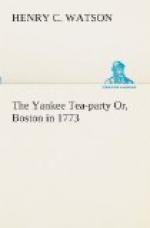Remember the glories of patriots
brave,
Though the days
of the heroes are o’er;
Long lost to their country
and cold in their grave,
They return to
their kindred no more,
The stars of the field, which
in victory pour’d
Their beams on
the battle are set,
But enough of their glory
remains on each sword
To light us to
victory yet.
Walloomsack! when nature embellished
the tint
Of thy fields
and mountains so fair,
Did she ever intend a tyrant
should print
The footsteps
of slavery there!
No! Freedom, whose smiles
we shall never resign,
Told those who
invaded our plains,
That ’t is sweeter to
bleed for an age at thy shrine,
Than to sleep
for a moment in chains.
Forget not the chieftain of
Hampshire, who stood
In the day of
distress by our side;
Nor the heroes who nourished
the fields with their blood,
Nor the rights
they secured as they died.
The sun that now blesses our
eyes with his light,
Saw the martyrs
of liberty slain;
O, let him not blush when
he leaves us to-night,
To find that they
fell there in vain!
Brown and Hanson had prepared their instruments during the singing, and immediately followed it with Washington’s march, to which knives and forks kept time.
[Illustration: Mr. Bleeker and his son.]
“An incident occurred just after the battle of Bennington, which showed the spirit of the people of the neighbourhood,” said Ransom, when the musicians had concluded. “Old Zedekiah Bleeker, who lived in Bennington, sent five bold sons to join our little army, just before the battle. One of them—Sam. Bleeker—was killed; and one of the old man’s neighbours came to tell him about it—’Mr. Bleeker,’ said the neighbour, ’your son has been unfortunate.’ ‘What!’ said the old man, ’has he misbehaved? Did he desert his post or shrink from the charge?’ ‘Worse than that,’ replied the neighbour; ‘he was slain, but he was fighting nobly.’ ’Then I am satisfied,’ said the old man; ‘bring him to me.’ Sam’s body was brought home. The old man wiped the blood from the wound, and while a tear stood in his eye, said it was the happiest day of his life, to know that he had five sons fighting for freedom and one slain for the same cause. There was a spirit of patriotism for you.”
“I can tell you of an instance quite as good,” said old John Warner. “Perhaps it is better; for in this instance, a woman displayed the like spirit. A good lady in 1775, lived on the sea-board, about a day’s march from Boston, where the British army then was. By some unaccountable accident, a rumour was spread, in town and country, in and about there, that the Regulars were on a full march for the place, and would probably arrive in three hours at farthest. This was after the battle of




